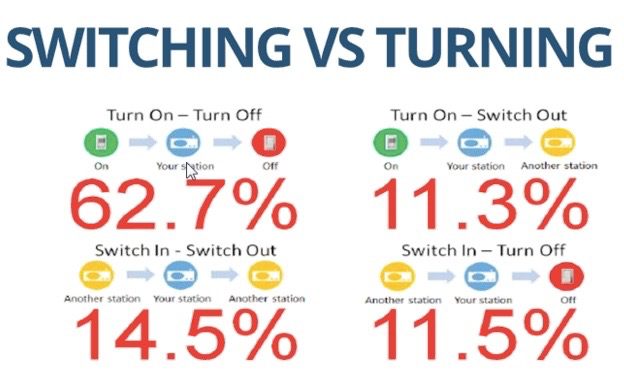So, what is more important?
Trying to keep listeners from tuning away… or attracting people to tune in?
Many would say the former. Almost all discussions inside the radio station – where to place the spot sets, traffic reports, and contests – focus on this. And for good reason. After all, listeners are already listening. It’s easier to get blood out of a turnip then to have to plant another crop.
But what does the data say?
“A major new study… reveals that nearly two-thirds of radio station listening occasions consist of listeners ‘turning on’ a station and end with them ‘turning off’ a station, as opposed to ‘switching in’ from and ‘switching out’ to other stations. “*
“Coleman Insights and Media Monitors… found that 62.7% of all occasions are Turn On-Turn Offs.” (It’s even higher – 77.9% – in the Christian format.)
“These findings are about the strongest reinforcement of the value of brand-building for radio stations that I can imagine,” commented Coleman Insights president/chief operating officer Warren Kurtzman, who co-authored the study. “The ability of a radio station to generate listening occasions through Turning On is dependent on having a strong brand, which is based on having high awareness, a clearly-defined position, association with multiple product attributes and eliciting passion from the audience.“

I wonder what would happen if you spent 62.7% of your time creating a radio station that is relevant, meaningful, and entertaining enough to have raving fans, and the rest of your time eliminating obstacles for longer listening.
“In the share of every station there are two numbers, the number to the left of the decimal point and the number to the right (e.g. 6.0, 6.3, etc.). The number to the left is affected by the big things that a station does, like what it is known for and the big benefits the listener gets from the station. The number to the right is based on the tweaks and minor modifications that the station does to the music, the commercial sequencing, etc.
You can make a mediocre station only slightly better by working on the number to the right all the time. You can make a mediocre station great by working on the number to the left of the decimal.”
~Michael O’Shea
*“The Components of Tuning Occasions – Switching vs. Turning” study… an analysis of nearly 37 million listening occasions by Coleman Insights and Media Monitors.




